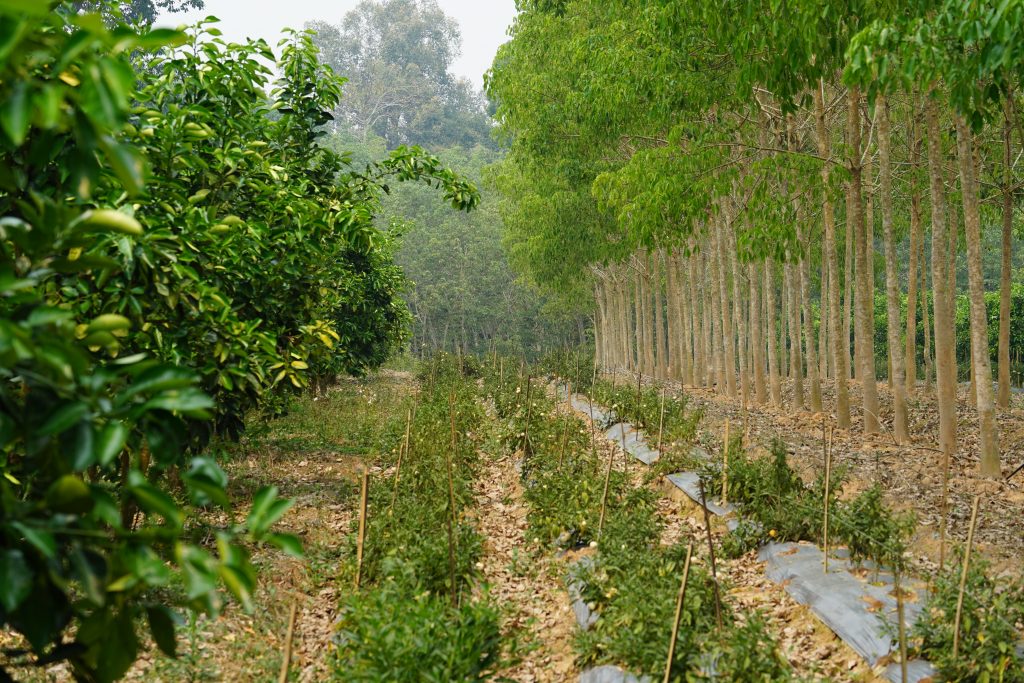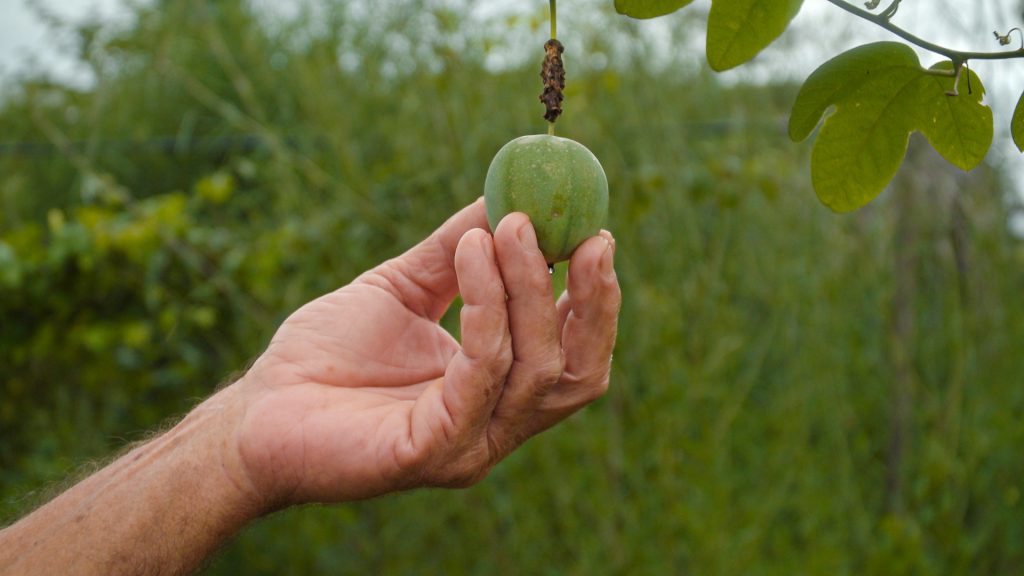- March 2024
During its final two years, the Trade, Development and Environment Hub (TRADE Hub) has been focusing on outreach, synthesis and collaboration, starting to develop key final outputs such as its “Pathways to Just and Sustainable Trade” and engaging with relevant stakeholders at local, national and global scales to find opportunities for implementation of research findings. As the TRADE Hub comes to a close, Communications Officer, Aisha Niazi reviews some of the Hub’s top highlights.
The UK Research and Innovation’s Global Challenges Research Fund is funding the UK Research and Innovation, Global Challenges Research Fund, Trade, Development and the Environment Hub, led by the UN Environment Programme World Conservation Monitoring Centre (UNEP-WCMC). The TRADE Hub is a five-year project, funded until 2024, and is the first research hub of its kind – bringing together over 50 organisations from 15 different countries to help make trade sustainable for people and the planet.
These partner organisations represent different actors from the public sector, private sector, farmers, forest users and rural communities, and civil society. Together, they explore all stages of various agricultural commodity and wildlife supply chains, revealing damaging links and potential ways to make lasting change in trade systems.
Bringing attention to the needs and aspirations of smallholders
A major goal of TRADE Hub has been to empower smallholders to shift to more sustainable practices and obtain fair economic returns. Low profit margins are not sustainable for smallholders. There is nobody better equipped to describe the challenges faced by farmers than the smallholders themselves. TRADE Hub has produced two documentaries to amplify the voices of those most impacted by trade, highlighting issues such as low profit margins and lack of access to finance and new technologies. The first film, A Smallholder’s Voice, was the only documentary launched at the World Trade Organisation (WTO) Public Forum in 2022. As the WTO opened its doors for its 2023 Public Forum, TRADE Hub colleagues readied themselves to launch a second short film to raise awareness about the issues faced by farmers producing organic fruit in the Brazilian Cerrado. This was accompanied by a panel discussing ways forward for smallholder farmers, underpinned by their collective vision of a trade system with the wellbeing of smallholders at its core.
Behind the scenes, TRADE Hub researchers continued to publish papers to advance knowledge pertaining to smallholders’ needs. For example, Marcello de Maria et al emphasise the necessity of formal land rights for smallholder farmers and local and indigenous peoples. Without security of land, farmers cannot plan for the long-term and local and indigenous peoples can be displaced in the process losing not only their homes, but also the land linked to their cultural practices and spiritual wellbeing. De Maria et al recommend that large companies ensure they obtain proper free, prior and informed consent in land deals with local communities.
Influencing policy at national and international levels
TRADE Hub partners are connected to a vast array of policy discussions. In its final years, the Hub has prioritised policy impact to codify measures to protect people and nature.
Wild meat (or ‘bushmeat’ in Africa) refers to terrestrial wild animals used for food in all parts of the world. As many as 2000 species are thought to be used as wild meat, and hunting and trapping is the most geographically widespread threat to mammals and birds. As urban populations across the world continue to grow, wild meat consumption is increasingly driven by urban demand, which drives hunting in rural areas. This can lead to unsustainable levels of extraction, which threatens the food security of indigenous and local rural communities who still depend on wild meat. National governments in the Congo Basin – including the governments of Cameroon, Gabon and Democratic Republic of Congo (DRC) – have been developing national strategies to enable the sustainable use of wild meat, and TRADE Hub researchers have been working with these governments to directly inform the development of these policies with up-to-date analyses of the use and drivers of wild meat in each country. Together with the WILDMEAT project, TRADE Hub researchers have conducted national level analyses of wild meat use in Gabon, Cameroon, and DRC, studying hunting and consumption rates, species targeted and market prices for wild and domestic meats. These were used to direct inform the Gabonese National Wildmeat Strategy and have been presented to the Cameroon and DRC governments through a series of policy workshops.
Policy impact did not end with wild meat, it extends to work on the trade of other commodities. One example is rubber. Researchers from the Royal Botanic Garden Edinburgh published a paper in Nature presenting the first high-resolution map of rubber for Southeast Asia and highlighting that rubber-linked deforestation had previously been underestimated in data widely used to support policy. This work contributed evidence to the European Union regulation on deforestation-free products (EUDR) which includes rubber on the list of products which required due diligence to ensure rubber products sold on the EU market are not derived from recently deforested land.

Aligning trade and biodiversity agendas
2023 was the birth year of the TRADE Hub’s new “Nature-positive trade” webinar series, led by Marianne Kettunen, Senior Policy Expert and Advisor for the TRADE Hub. The series defines nature-positive trade as “trade with an aspiration to proactively work towards contributing to the goals and targets of the Global Biodiversity Framework”. The first two webinars brought together insights from different international organisations such as, the WTO, UNCTAD and International Trade Centre, with discussions highlighting an enthusiasm for collaboration between trade and biodiversity communities going forwards.
For example, the second webinar highlighted ways of achieving sustainable use of marine resources, including fisheries. It highlighted many areas for collaboration, such as a major role for biodiversity experts to provide fishers with technical assistance so they can independently collect fish stock and sustainability data.
For more information on future webinars and findings from past webinars, please visit this page.
Innovative new tools, indicators and games
TRADE Hub scientists continued doing what they do best – finding new ways to visualise and explore data. A series of innovative tools, indicators and even games have been trialed and launched in 2023. For example, the Joint Nature Conservation Committee (JNCC) and Stockholm Environment Institute (SEI) York recently released a new Global Environmental Impacts of Consumption (GEIC) indicator that estimates the levels of deforestation, biodiversity loss and water stress resulting from the consumption of specific countries across the globe. Balancing out consumption patterns will be key in making trade just and sustainable. This indicator will be useful in assessing whether a country’s consumption is at sustainable levels and identify where it has contributed to environmental degradation.
TRADE Hub is now advancing into the world of games: both in-person and online. Exploring topics as a player allows users to become immersed in an issue, such as traceability and encourages independent discoveries of inequalities and solutions. TRADE Hub researchers working on sustainable cocoa partnered with LEAF Inspiring Change to develop a strategy game offering players the opportunity to identify spaces for positive change on palm oil supply chains. The game was played during the UNEP regional consultation in Cameroon in May and a similar game focused on cocoa set to be played by more relevant stakeholders at the Amsterdam Sustainable Cocoa Conference in February 2024.
The CIFOR team in Indonesia are presently trialing their new “Landscape Game” to promote a landscape approach to sustainable trade, aimed at university students, policymakers and practitioners. The game will be officially launched later in the year.
Highlighting TRADE Hub research at events across the globe
2023 was a year of many events in a plethora of countries, with many more to come in 2024. TRADE Hub team members, researchers and partners attended events across the globe to present research findings and launch outputs related to agricultural commodity, wild meat and wildlife trade. Events that inspired collaboration and a sharing of ideas included UNEP Trade and Environment Hub’s regional consultations in Latin America, Africa and Asia in which a variety of stakeholders across agricultural commodity trade supply chains came together to discuss challenges and opportunities for nature-positive trade across each region. Researchers also presented their research findings at a host of events, for example, Oxford Research Fellow Paulo Wilfred, working on wild meat trade as part of the TRADE Hub presented his findings on unlicensed subsistence hunting in Tanzania as part of the Tanzania Wildlife Research Institute 14th Scientific Conference 2023 (TAWIRI) in December.
TRADE Hub also showcased three videos as part of UNDP Nature for Life Hub 2023. This event garners the attention of thousands of stakeholders interested in a nature-positive future each year. The Hub contributed to the theme of “Delivering a Nature-Positive Economy through Business and Finance” and launched a video explaining the vision behind the upcoming “Roadmap to Just and Sustainable Trade”, a short documentary on the challenges faced by organic fruit farmers in the Cerrado, and re-highlighted their first documentary “A Smallholder’s Voice”.

Image by Thomas Mendel, filmmaker of “Coexistence”, a documentary based in the Brazilian Cerrado
TRADE Hub in 2024: Final events, a new website and lots of synthesis products
The TRADE Hub project will formally end in March 2024, but not before the launch of new synthesis products and communications outputs. As the project draws to a close, the focus will be on synthesising a huge number of research findings and making these navigable and accessible beyond 2024. To do so, the Hub will launch a legacy website to allow stakeholders to explore research and find tailored findings and recommendations.
2024 will also be the year that the Hub’s global “Pathways to Just and Sustainable Trade” is launched, with action tracks towards achieving a vision of just and sustainable trade that respects planetary boundaries and promotes well-being. Country teams in Indonesia and Cameroon will also launch national roadmaps, alongside synthesis pieces on wild meat and wildlife trade, as well as a microsite demonstrating the Hub’s overall impact.
Country teams will also be hosting final events to discuss the overall impact of the Hub and celebrate achievements to date among the diverse range of dedicated researchers and partners who drove action in 2023 and beyond.
To stay up to date with new research, events, synthesis products and launches, follow TRADE Hub on Twitter and LinkedIn and sign up to our mailing list.